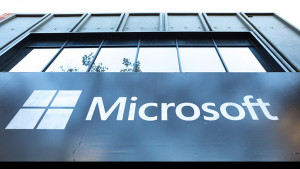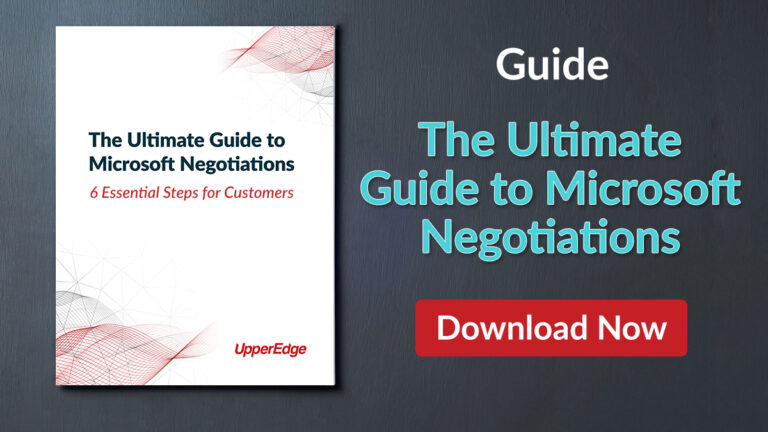- September 12, 2023
- Adam Mansfield
- Reading Time: 6 minutes

If you have ever been the one to negotiate with Microsoft, you have most likely stayed up many nights trying to figure out how you were going to successfully spin a 20% annual increase in a way that reduces your Microsoft licensing costs. I am no longer surprised when I hear stories of significant and unexpected increases being positioned during Microsoft contract renewals.
It is not hard to figure out why this is so often the case. When it comes to many of the core Microsoft products (Office, Windows, etc.), there are still a limited set of viable alternatives. Google is certainly trying to make things interesting, but Microsoft is already very much entrenched in companies using its solutions for the past several years. This makes it far too complicated, if not impossible, to even start to consider moving away from Microsoft.
Moving your entire company off Microsoft’s products (the Office suite, most specifically) would be a change management nightmare that would cause productivity to drop. Interestingly enough, productivity improvement is one of the core reasons companies are so heavily reliant on Microsoft’s products in the first place.
Microsoft is well aware of this and knows they hold all the cards when it comes time to discuss a customer’s renewal. During one renewal, a Microsoft sales rep actually told an IT executive that there was nothing else they could do to meet their requirements and that he could always try and see what the ‘other’ Microsoft might offer him if he was not satisfied. Yes, this actually happened.
In fairness, this was before Satya Nadella became CEO and started to reshape the corporate culture. Under Nadella’s leadership, we have seen a more customer-focused Microsoft, but there are still many obstacles in the way of achieving a deal that includes proper price protections, flexibility and improved discounting beyond the standard volume discounting Microsoft offers.
Additionally, Microsoft is always evolving with the market around it and adjusting its playbook accordingly. For example, Microsoft increased prices on the Microsoft 365 and Office 365 suite of products because of the increased value they have provided in the last decade and embraced AI by making a multi-billion-dollar investment in OpenAI and ChatGPT, leading to the introduction of Teams Premium and the AI-enhanced Viva Sales.
Given these obstacles, executives often ask two questions:
- Are we alone and being treated differently than everyone else? The answer, if you haven’t already guessed, is no. Unfortunately, Microsoft tends to treat most organizations and their longstanding customer base in this manner — often because they can and are not challenged to act differently.
- Is there hope in actually achieving a better deal with Microsoft through negotiation? The answer to this question is, thankfully, yes. If you prepare yourself appropriately, know the right questions to ask, have a good story, and are armed with up-to-date market intelligence, you can absolutely achieve a better deal through your Microsoft contract negotiations.

Here are four immediate points Microsoft customers should consider in order to refine their Microsoft renewal negotiation strategy and put themselves in the best position to succeed.
1. Gather Granular Utilization Detail
Having a complete (and organized) understanding of your company’s entitlements, on a line-item basis, along with the actual levels of utilization, is a critical dataset to have when discussing actual value received versus fees paid with Microsoft.
Ideally, you want to be able to communicate the dollar value associated with any under-utilization to show the lost value. As obvious as this may seem, far too many companies fail to effectively pull this level of detail together and thus lose out on an opportunity to pull a significant negotiation lever with Microsoft that could reduce spending on your Microsoft license.
Being able to remind Microsoft of the heavy sales-pitch they made explaining why you needed to include the cloud bundle Microsoft 365 (formerly Enterprise Cloud Suite or Secure Productive Enterprise) in your last renewal, and then showing Microsoft that you never used all the features of the Office 365 component of the bundle or any of the other key components, like EM+S, is a very powerful message during your negotiation.
This is especially the case when Microsoft is looking to add more new products to your portfolio or moving you to the next plan (e.g., Office 365 or Microsoft 365 E5), while also significantly uplifting the fees associated with the products you already have adopted.
2. Complete a Software Assurance Benefits Assessment
When you renew non-subscription cloud products (SQL server, etc.) licensed under Microsoft’s enterprise agreement, you are effectively renewing (and paying for) Software Assurance (SA) since you already own the underlying license and the most recently released version. Given this, it is important to assess whether you have realized the full value of SA and whether you will realize the full value moving forward.
Software Assurance benefits are organized into four major categories:
- Deploy and Manage (new version rights)
- Training
- Support
- Specialized (spread out payments)
But very few companies receive the full benefit of Software Assurance and some don’t even know the full scope of benefits that are included. The issue with Microsoft is that you don’t get to pick and choose the SA benefits you will be using and pay for only those particular benefits — it is an all or nothing option. Software Assurance is Software Assurance.
If positioned correctly, though, there is an opportunity to present to Microsoft the limited value previously received along with the value you expect to receive from SA moving forward, to achieve valuable concessions in other areas of your negotiation that can offset your concern for the lack of value. This includes, but is not limited to, achieving additional Microsoft discounting beyond the standard volume discount.
3. Evaluate products that are valuable to Microsoft
Microsoft’s go-forward strategy and ambitions are very clear — they want to build and sell best-in-class platforms and products to align with the needs and requirements of organizations embarking on their necessary digital transformations.
They also consistently communicated to the analyst and investor community fairly aggressive product adoption goals. Therefore, Microsoft’s share price is also impacted by their ability to sell more Microsoft products and solutions to existing and new customers. They, just like most (if not all) IT vendors, especially cloud-focused vendors, are interested in increasing the annual run rate through successfully executing to their ‘land and expand’ playbook.
Although I would never recommend buying products you don’t need just for the sake of trying to get a “good” deal, companies evaluating new products or who have more robust plans for products already in use have an attractive story that can influence the ability to achieve concessions from Microsoft. This is especially the case when the products under consideration have competitive alternatives and represent strategic products directly tied to Microsoft’s go-forward strategy and ambitions.
Most specifically, a company seriously considering adopting one or a combination of one of Microsoft’s key cloud offerings (Office 365, Microsoft’s cloud bundle Microsoft 365, Azure, and Dynamics 365) as part of an upcoming renewal has a significant amount of leverage, and if used correctly, can achieve a best-in-class deal with Microsoft.
4. Develop a strategic timeline
Developing a holistic Microsoft negotiation strategy is key to your success. In order to effectively negotiate your Microsoft license agreement, you need to level the playing field and take back control to ensure your Microsoft EA negotiation process benefits your organization at least as much as it does Microsoft. This is essential if you wish to safeguard your company’s financial performance, improve your strategic relationship with Microsoft, optimize your SA benefits, protect your IT infrastructure, and keep your license compliance management status quo.
In order to ensure you own the renewal process with Microsoft, you will need to follow this 6-month timeline:
| 6 Months Before Renewal |
Start to finalize your internal Microsoft IT roadmap, including current product usage, license entitlements and SA benefits, and potential go-forward product and solution needs including Azure, LinkedIn, etc. |
| 5 Months Before Renewal |
Conduct any necessary product and solution workshops with Microsoft and/or your reseller. This could be tied to products and features that are not being utilized and products that may be of interest to be added to your Microsoft portfolio. |
| 4 Months Before Renewal |
Meet with Microsoft and your reseller to determine your best renewal options based on your understood go-forward requirements. Discuss your expected go-forward engagement process with Microsoft and communicate your optimal renewal options to them. |
| 3.5 Months Before Renewal | Receive pricing based on your optimal renewal options. |
| 3 Months Before Renewal |
Conduct a top-to-top meeting with Microsoft to clarify your requirements and commercial requirements. Request detailed proposals (pricing, commercial terms, flexibility, protections, etc.) |
| 2 Months Before Renewal |
Review updated proposal responses. Conduct additional top-to-top meeting(s) with Microsoft to confirm your expectations. |
| 1 Month Before Renewal |
Finalize commercial terms and review the renewal documents. |
Before you execute your renewal documents, ensure that your organization has set itself up for a relationship that is in your best interests by mapping out a Microsoft enterprise agreement negotiation strategy that works for you. If you do not take charge of this process, your organization will likely be condemned to an ever-growing dependence on Microsoft. YOU need to be in charge of how and when your EA renewal is negotiated.
To explore how UpperEdge’s Microsoft experts can help you develop a robust Microsoft negotiation strategy, explore our Microsoft advisory services.
Related Blogs
Microsoft Dynamics 365 Price Increases: What to Expect Between Now and October
Understanding Microsoft’s Removal of From SA SKUs: Customer Impacts and Recommendations
What Matters Most to Microsoft in 2024
About the Author

